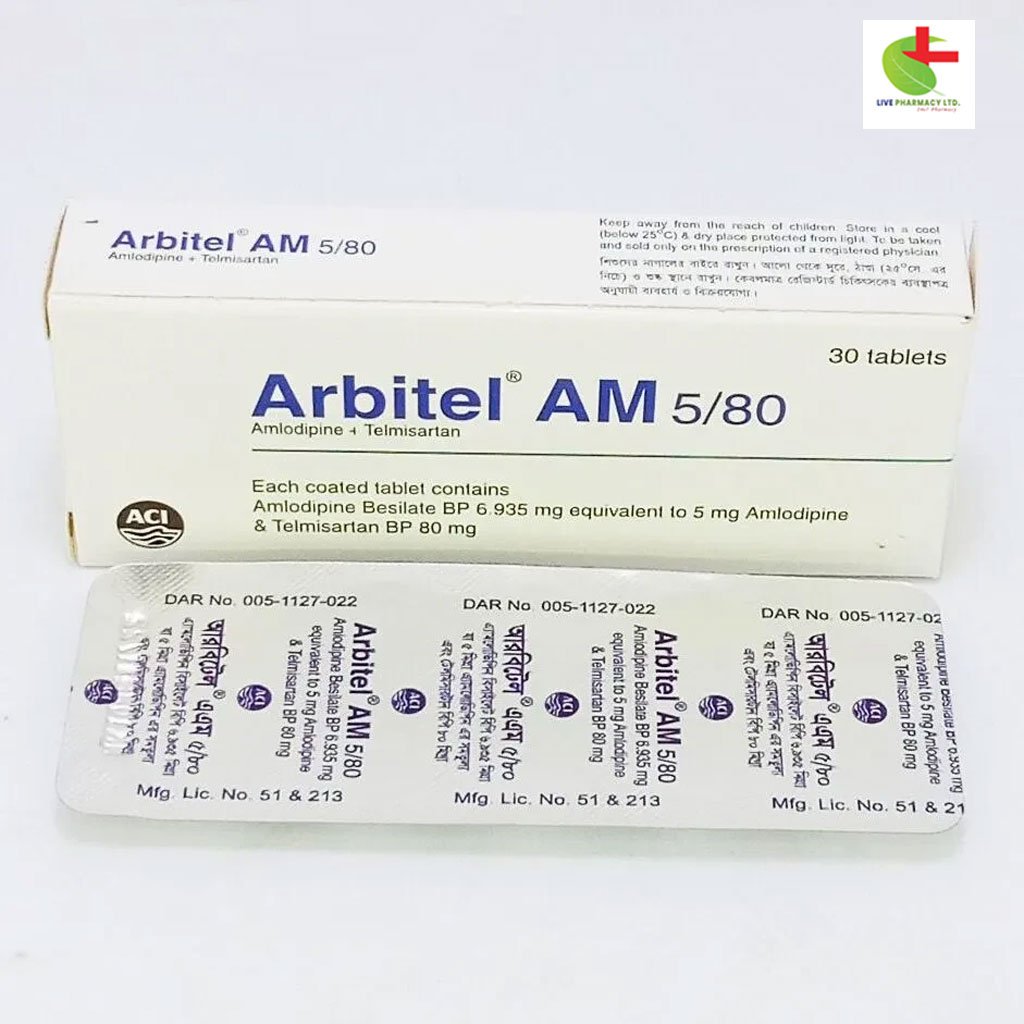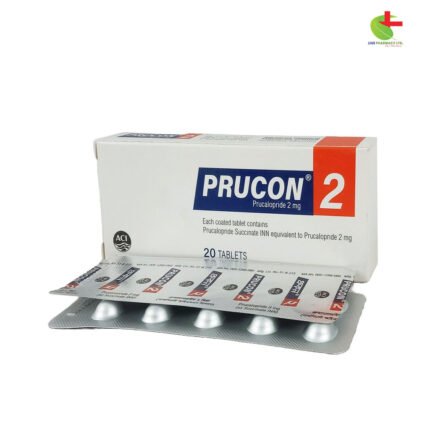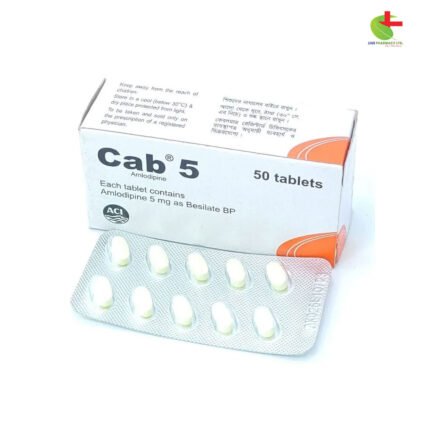Arbitel AM
200.00৳ Strip(10)
- Arbitel AM is a combination of Telmisartan and Amlodipine, used to manage hypertension.
- It can be used alone or with other antihypertensive medications to achieve optimal blood pressure control.
- This fixed-dose combination helps dilate blood vessels and reduce vascular resistance, lowering blood pressure effectively.
- It is suitable for initial therapy or as an add-on for patients not adequately controlled by single-drug treatment.
 Brand
Brand
|
ACI Limited |
|---|---|
 Generics
Generics
|
Amlodipine Besilate + Telmisartan |
 Type
Type
|
Tablet |
Indications:
Arbitel AM is prescribed for managing hypertension, either alone or in combination with other antihypertensive medications. It can also serve as a first-line treatment for patients who may need multiple drugs to effectively control their blood pressure.
Always consult a registered healthcare professional before use.
Pharmacology:
Arbitel AM combines Telmisartan, an angiotensin II receptor blocker (ARB), and Amlodipine, a calcium channel blocker (CCB), to provide effective blood pressure control.
- Telmisartan works by selectively blocking the AT1 subtype of the angiotensin II receptor, which is responsible for causing vasoconstriction, stimulating aldosterone production, and increasing blood pressure. By inhibiting these effects, Telmisartan helps lower blood pressure without affecting the heart rate. It has a significantly higher affinity for the AT1 receptor than the AT2 receptor, ensuring effective blood vessel dilation and blood pressure reduction.
- Amlodipine, a dihydropyridine calcium-channel blocker, prevents calcium ions from entering smooth muscle and cardiac muscle cells, which relaxes blood vessels and reduces peripheral vascular resistance, further lowering blood pressure.
Dosage & Administration:
- Initial Therapy: Arbitel AM may be used as initial therapy when monotherapy is unlikely to achieve adequate blood pressure control. The typical starting dose is 40/5 mg once daily, with the dose potentially increasing to 80/5 mg for patients requiring more significant blood pressure reduction. This combination is not recommended for patients aged 75 or older, or those with hepatic impairment.
- Add-on Therapy: For patients inadequately controlled by Amlodipine or Telmisartan alone, this combination may be used. Patients with Amlodipine-induced side effects, like edema, can switch to Arbitel AM to maintain antihypertensive efficacy with a reduced dose of Amlodipine.
- Replacement Therapy: For those already taking Telmisartan and Amlodipine separately, Arbitel AM can be substituted with the same dosages of both drugs in a single tablet. Dosage adjustments can be made after at least two weeks, with a maximum recommended dose of 80/10 mg once daily.
Always follow your healthcare provider’s guidance.
Drug Interactions:
- Telmisartan does not significantly interact with commonly used medications such as acetaminophen, Amlodipine, simvastatin, or warfarin. It is not metabolized by the cytochrome P450 system but may inhibit CYP2C19 to a minor extent.
- Amlodipine can be used alongside various other medications, including diuretics, beta-blockers, and anti-inflammatory drugs, without clinically significant interactions. It has no notable impact on the pharmacokinetics of drugs like atorvastatin and warfarin.
Contraindications:
- Do not use Arbitel AM if you are hypersensitive to any of its ingredients, pregnant, breastfeeding, or have severe liver impairment, biliary obstructive disorders, hypotension, or certain heart conditions.
Side Effects:
Common side effects may include dizziness, swelling, headache, fatigue, abdominal discomfort, and muscle pain. Consult your doctor if you experience any concerning symptoms.
Pregnancy & Lactation:
- Telmisartan and Amlodipine are not recommended during pregnancy, particularly in the second and third trimesters, due to potential risks to the fetus. These medications may also be excreted in breast milk, so nursing should be avoided if treatment is necessary.
Precautions & Warnings:
- Careful monitoring is needed to avoid low blood pressure, especially in patients with volume depletion or salt imbalance.
- Gradual dosage increases are recommended for those with liver or severe kidney impairment.
- Patients with heart failure or coronary artery disease should be monitored for potential complications like worsened heart failure or increased risk of heart attack.
Special Populations:
- Pediatric Use: The safety and effectiveness of Arbitel AM in children have not been established.
- Geriatric Use: This combination is not advised for patients aged 75 or older without prior medical consultation.
- Hepatic Impairment: Not recommended for those with significant liver dysfunction.
Overdose Effects:
- Telmisartan: Overdose may result in low blood pressure, dizziness, and tachycardia. In such cases, supportive care should be initiated.
- Amlodipine: Overdose may lead to severe hypotension, requiring urgent medical intervention, including fluid administration and, if needed, vasopressor therapy.
Therapeutic Class:
Arbitel AM is classified as a combined antihypertensive medication.
Storage Conditions:
Store at temperatures below 30°C, away from light and moisture. Keep out of reach of children.













Reviews
There are no reviews yet.